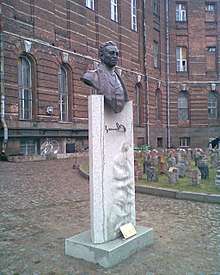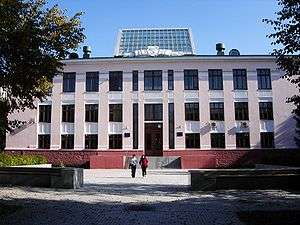Zeki Velidi Togan
| Zeki Velidi Togan | |
|---|---|
 | |
| Born |
December 10, 1890 Bashkortostan |
| Died |
July 26, 1970 (aged 79) Istanbul, Turkey |
| Occupation | Historian |
Zeki Velidi Togan (Bashkir: Әхмәтзәки Әхмәтшаһ улы Вәлидов, Äxmätzäki Äxmätşah ulı Wälidov, ﺋﻪحمەتزەكى ئەجمەتشاه ئولئ وەلىدﯘو; Russian: Ахмет-Заки Ахметшахович Валидов, Ahmet-Zaki Ahmetšachovič Validov, sometimes spelled as Validi) (1890–1970 Istanbul) was a Turkic historian,[1] Turkologist,[2] and leader of the Bashkir revolutionary and liberation movement.
Biography

He was born in Kuzyanovo (Bashkir: Көҙән) village of Sterlitamak uyezd, Ufa Governorate (in present-day Ishimbaysky District, Bashkortostan).
From 1912–1915 Velidi taught in the madrassa (school) in Kazan (Qasímiä), and from 1915 to 1917 he was a member of bureau, supporting Muslim deputies at the State Duma. In 1917 he was elected to Millät Mäclese, and with Şerif Manatov he organized the Bashkir Shura (Council). The Bashkir Congress at Orenburg in November–December 1917, of which Velidi was chairman, declared Bashkortostan's Independence. However, he was arrested 3 February 1918 by the Soviet forces.[3]
In 1918 and 1919 Velidi's Bashkir troops first fought under Ataman Alexander Dutov, then under Admiral Kolchak against Bolshevik forces. After the RSFSR promised autonomy to Bashkirs, Velidi switched allegiance, fighting with the Bolsheviks.
From February 1919 to June 1920, he was chairman of the Bashrevkom (Bashkir Revolutionary Committee). He attended the Congress of the Peoples of the East held in Baku in September 1920, where he became involved in drawing up the statutes of ERK, a Muslim Socialist organisation. However, feeling the Bolsheviks had broken their promises, he became more critical of them when he moved to Central Asia.
In Turkistan, Velidi became a leader of the Basmachi Movement (Paksoy 1992). From 1920 to 1923 he was chairman of the "National Union of Turkistan". In 1923 Validi emigrated, after discovering original manuscripts of Ahmad ibn Fadlan in Iran.
From 1925 Velidi lived in Turkey, becoming a teacher and professor at Istanbul University. However, his controversial critique of the Turkish history thesis forced him to seek refuge in Vienna.[4] He later gained a doctor of philosophy in 1935 at the University of Vienna. Later he was a professor at Bonn University (1935–1937) and Göttingen University (1938–1939). In 1953 he became organizer of the İslam Tetkikleri Enstitüsü (Institute for Islamic Studies) at Istanbul University. In 1967, he was given an honorary doctorate from the University of Manchester.
At the same time he contributed to the Encyclopedia of Turkic Peoples. His articles about culture, language and history of Turkic peoples have been translated into many languages.
References
- ↑ Censorship and History:1914-1945:Historiography in the Service of Dictatorships, Antoon De Baets,The Oxford History of Historical Writing: Volume 4: 1800-1945, ed. Stuart Macintyre, Juan Maiguashca and Attila Pók, (Oxford University Press, 2011), 138, 147.
- ↑ Literary History: Towards a Global Perspective: Notions of Literature Across Times and Cultures, Vol.1, ed. Anders Pettersson, (Gmbh & Co., 2006), 299.
- ↑ Schafer, Daniel E. (2004). "Togan, Ahmed Zeki Validov". Encyclopedia.com. The Gale Group. Retrieved 15 July 2016.
- ↑ Late Ottoman and Early Republican Turkish Historical Writing, Cemal Kadafar and Hakan T. Karateke,The Oxford History of Historical Writing: Volume 4: 1800-1945, 574.
Further reading
- Paksoy, Hasan (June 1995), "Basmachi Movement from Within: Account of Zeki Velidi Togan", Nationalities Papers, 23 (2): 373–399, doi:10.1080/00905999508408381, retrieved 18 Dec 2005 .
- Paksoy, Hasan (1992), "Z. V. Togan: The Origins of the Kazaks and the ôzbeks", Central Asian Survey, 11 (3), doi:10.1080/02634939208400781, retrieved 18 Dec 2005 .
- Z.V.Togan. MEMOIRES: Struggle for National and Cultural Independence of the Turkistan and other Moslem Eastern Turks
- Copeaux, Etienne (1993), « Le mouvement prométhéen », Cahiers d'études sur la Méditerranée orientale et le monde Turco-iranien (CEMOTI), 16: 9-45. http://www.ceri-sciencespo.com/publica/cemoti/textes16/copeaux.pdf
- Zeki Velidi Togan MEMOIRS: National Existence and Cultural Struggles of Turkistan and other Moslem Eastern Turks https://www.amazon.com/dp/1468005685/ref=cm_sw_su_dp 510 Pp.
- Zeki Velidi Togan MEMOIRS: National Existence and Cultural Struggles of Turkistan and other Moslem Eastern Turks---full text translated from the original
- Zaur Gasimov, « Transfer and Asymmetry », European Journal of Turkish Studies [Online], 24 | 2017, Online since 8 November 2017, connection on 17 November 2017. URL : http://ejts.revues.org/5432
External links
| Wikimedia Commons has media related to Zeki Velidi Togan. |